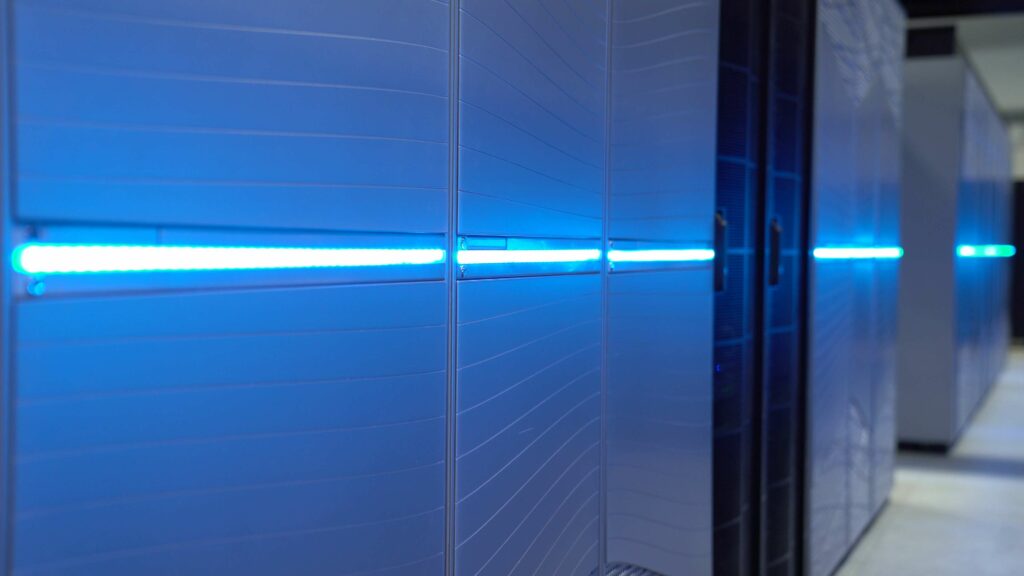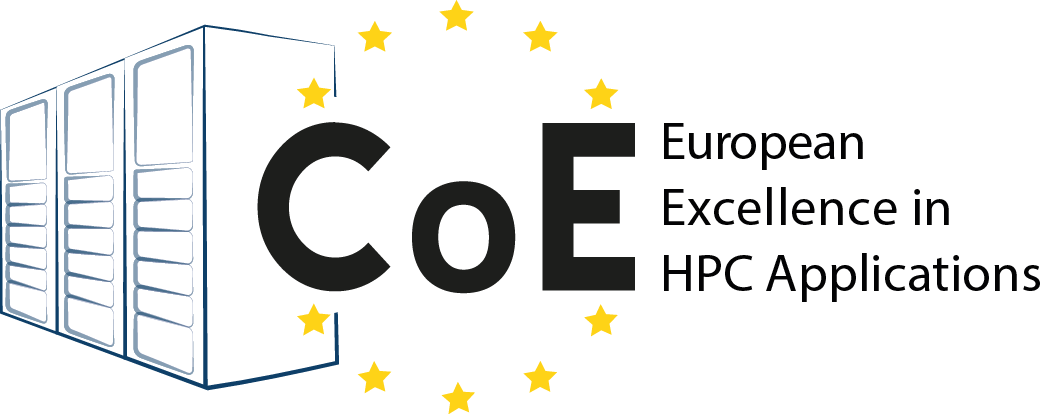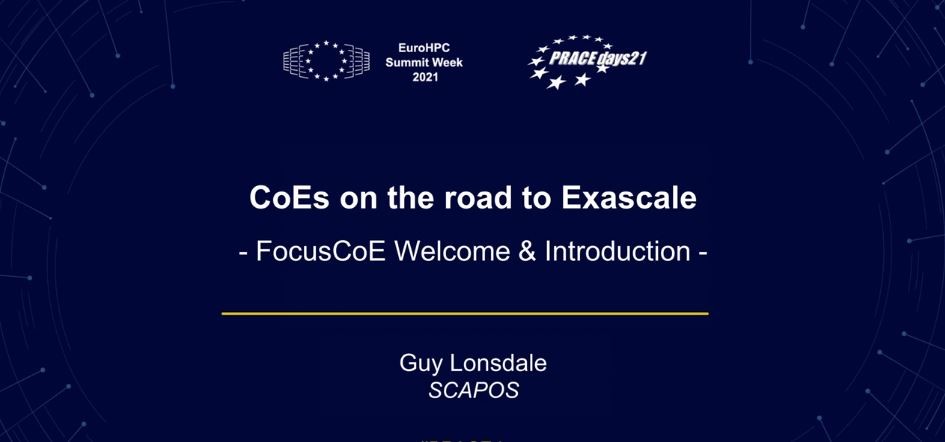- Homepage
- >
- Search Page
- > News
- >
FocusCoE Completes its Mission to Support the Consolidation of CoEs’ Role in the EU HPC Ecosystem
As of 31 March, 2022, the EU-funded coordination and support action FocusCoE has successfully completed its project activities, which have supported the European High-Performance Computing Centres of Excellence (HPC CoEs) by enhancing their interaction with industry, facilitating inter HPC CoE collaboration, and strengthening their position in the European HPC ecosystem. Moreover, FocusCoE broadened the promotion of EU HPC CoEs and their relevance inside and outside of the EU HPC ecosystem through a variety of compiled materials on HPC CoE activities including some for a non-technical audience. Lastly, FocusCoE created the HPC CoE Council (HPC3) and the central hub for CoE resources at hpccoe.eu, which will both continue supporting ongoing and future HPC CoEs to coordinate their efforts and reaching new stakeholders in European industry, research, and public administration.
Although the originally planned methods for supporting CoEs had to be modified due to the Covid-19 pandemic, the major objectives have borne fruit – realizing a great deal of cross-CoE collaboration and interaction. As an example, FocusCoE coordinated concerted outreach to industry by identifying and organizing participation in 11 sectorial events related to work being done by HPC CoEs. In all, the EU HPC CoEs are active in the domains of energy, computational (bio-)medicine, material science, engineering, computational chemistry, earth system modelling, and global challenges. FocusCoE also hosted workshops for the HPC CoEs addressing various aspects related to business development and best practices for industry outreach. Additionally, 6 CoE directed training events were organized around EU HPC training needs and best practices while trainings offered by HPC CoEs were promoted via a centralized CoE training registry. The Covid-19 related shift from in-person to virtual activities in the middle of the project also prompted FocusCoE to create template materials and guides for both in-person and virtual events, which will support current and upcoming EU HPC CoEs in a greater variety of activities in the future. Overall, these activities worked to increase awareness of and competence in HPC applications across the EU HPC ecosystem to ensure a robust user base for the HPC CoE software that will be used on the next generation of HPC machines.
“While each individual CoE has had a primary objective to prepare their community’s applications for Exascale computing,” says Project Coordinator Guy Lonsdale, “we have seen many benefits arising from cross-CoE collaborations and presenting a common strategic position with regards to the development of the EuroHPC ecosystem. I am pleased to see that FocusCoE played a key role in that.”
Public awareness and understanding of high-performance computing were strengthened through the creation of a variety of FocusCoE resources. Based on HPC CoE activities, FocusCoE selected success stories and use cases to illustrate the breadth of HPC CoE work to audiences unfamiliar with the EU HPC CoEs. Additionally, FocusCoE consolidated various HPC CoE contributions to addressing societal challenges for a non-technical audience. An article published in the first year of the Covid-19 pandemic explained how HPC CoEs working in everything from biomolecular modelling to materials science were helping combat the pandemic. More recently, an article on how HPC CoEs are helping to mitigate the consequences of climate change provided a non-technical explanation of work in novel materials for carbon capture, alternative sources of energy, and computer modelling to track urban air pollution.
The important role played by the HPC CoEs is illustrated by their continuation within the latest EuroHPC Joint Undertaking work programme. Accordingly, strategic collaboration among HPC CoEs will continue to be supported by FocusCoE activity through its creation of the HPC CoE Council, which is maintaining its independent operation after the end of the project. The unique one-stop-shop central hub of CoE information will also endure on the hpccoe.eu website. Going forward, many of the CoEs have the potential to contribute to the European objective of reducing global dependencies through their HPC-enabled tools supporting the development of new technologies and solutions, for example in the areas of renewable energy and new materials.
Mitigating the Impacts of Climate Change: How EU HPC Centres of Excellence Are Meeting the Challenge
“The past seven years are on track to be the seven warmest on record,” according to the World Meteorological Organization. Furthermore, the earth is already experiencing the extreme weather consequences of a warmer planet in the forms of record snow in Madrid, record flooding in Germany and record wildfires in Greece in 2021 alone. Although EU HPC Centres of Excellence (CoEs) help to address current societal challenges like the Covid-19 pandemic, you might wonder, what can the EU HPC CoEs do about climate change? For some CoEs, the answer is fairly obvious. However just as with Covid-19, the contributions of other CoEs may surprise you!
Given that rates of extreme weather events are already increasing, what can EU HPC CoEs do to help today? The Centre of Excellence in Simulation of Weather and Climate in Europe (ESiWACE) is optimizing weather and climate simulations for the latest HPC systems to be fast and accurate enough to predict specific extreme weather events. These increasingly detailed climate models have the capacity to help policy makers make more informed decisions by “forecasting” each decision’s simulated long-term consequences, ultimately saving lives. Beyond this software development, ESiWACE also supports the proliferation of these more powerful simulations through training events, large scale use case collaborations, and direct software support opportunities for related projects.
Even excepting extreme weather and long-term consequences, though, climate change has other negative impacts on daily life. For example the World Health Organization states that air pollution increases rates of “stroke, heart disease, lung cancer, and both chronic and acute respiratory diseases, including asthma.” The HPC and Big Data Technologies for Global Systems Centre of Excellence (HiDALGO) exists to provide the computational and data analytic environment needed to tackle global problems on this scale. Their Urban Air Pollution Pilot, for example, has the capacity to forecast air pollution levels down to two meters based on traffic patterns and 3D geographical information about a city. Armed with this information and the ability to virtually test mitigations, policy makers are then empowered to make more informed and effective decisions, just as in the case of HiDALGO’s Covid-19 modelling.
What does MAterials design at the eXascale have to do with climate change? Among other things, MaX is dramatically speeding up the search for materials that make more efficient, safer, and smaller lithium ion batteries: a field of study that has had little success despite decades of searching. The otherwise human intensive process of finding new candidate materials moves exponentially faster when conducted computationally on HPC systems. Using HPC also ensures that the human researchers can focus their experiments on only the most promising material candidates.
Continuing with the theme of materials discovery, did you know that it is possible to “capture” CO2 from the atmosphere? We already have the technology to take this greenhouse gas out of our air and put it back into materials that keep it from further warming the planet. These materials could even be a new source of fuel almost like a man-made, renewable oil. The reason this isn’t yet part of the solution to climate change is that it is too slow. In answer, the Novel Materials Discovery Centre of Excellence (NoMaD CoE) is working on finding catalysts to speed up the process of carbon capture. Their recent success story about a publication in Nature discusses how they have used HPC and AI to identify the “genes” of materials that could make efficient carbon-capture catalysts. In our race against the limited amount of time we have to prevent the worst impacts of climate change, the kind of HPC facilitated efficiency boost experienced by MaX and NoMaD could be critical.
Once one considers the need of efficiency, it starts to become clear what the Centre of Excellence for engineering applications EXCELLERAT might be able to offer. Like all of the EU HPC CoEs, EXCELLERAT is working to prepare software to run on the next generation of supercomputers. This preparation is vital because the computers will use a mixture of processor types and be organized in a variety of architectures. Although this variety makes the machines themselves more flexible and powerful, it also demands increased flexibility from the software that runs on them. For example, the software will need the ability to dynamically change how work is distributed among processors depending on what kind and how many a specific supercomputer has. Without this ability, the software will run at the same speed no matter how big, fast, or powerful the computer is: as if it only knows how to work with a team of 5 despite having a team of 20. Hence, EXCELLERAT is preparing engineering simulation software to adapt to working efficiently on any given machine. This kind of simulation software is making it possible to more rapidly design new airplanes for characteristics like a shape that has less drag/better fuel efficiency, less sound pollution, and easier recycling of materials when the plane is too old to use.
Another CoE using HPC efficiency to make our world more sustainable is the Centre of Excellence for Combustion (CoEC). Focused exclusively on combustion simulation, they are working to discover new non-carbon or low-carbon fuels and more sustainable ways of burning them. Until now, the primary barrier to this kind of research has been the computing limitations of HPC systems, which could not support realistically detailed simulations. Only with the capacity of the latest and future machines will researchers finally be able to run simulations accurate enough for practical advances.
Outside of the pursuit for more sustainable combustion, the Energy Oriented Centre of Excellence (EoCoE) is boosting the efficiency of entirely different energy sources. In the realm of Wind for Energy, their simulations designed for the latest HPC systems have boosted the size of simulated wind farms from 5 to 40 square kilometres, which allows researchers and industry to far better understand the impact of land terrain and wind turbine placement. They are also working outside of established wind energy technology to help design an entirely new kind of wind turbine.
In work also related to solar energy, the EoCoE Materials for Energy group is finding new materials to improve the efficiency of solar cells as well as separately working on materials to harvest energy from the mixture of salt and fresh water in estuaries. Meanwhile, the Water for Energy group is improving the modelling of ground water movement to enable more efficient positioning of geothermal wells and the Fusion for Energy group is working to improve the accuracy of models to predict fusion energy output.
EoCoE is also developing simulations to support Meteorology for Energy including the ability to predict wind and solar power capacity in Europe. Unlike our normal daily forecast, energy forecasts need to calculate the impact of fog or cloud thickness on solar cells and wind fluctuations caused by extreme temperature shifts or storms on wind turbines. Without this more advanced form of weather forecasting, it is unfeasible for these renewable but variable energy sources to make up a large amount of the power supplied to our fluctuation sensitive grids. Before we are able to rely on wind and solar power, it will be essential to predict renewable energy output in time to make changes or supplement with alternate energy sources, especially in light of the previously mentioned increase in extreme weather events.
Suffice it to say that climate change poses a variety of enormous challenges. The above describes only some of the work EU HPC CoEs are already doing and none of what they may be able to do in the future! For instance, HiDALGO also has a migration modelling program currently designed to help policy makers divert resources most effectively to migrations caused by conflict. However, similar principles could theoretically be employed in combination with weather modelling like that done by ESiWACE to create a climate migration model. Where expertise meets collaboration, the possibilities are endless! Make sure to follow the links above and our social media handles below to stay up to date on EU HPC CoE activities.
FocusCoE at EuroHPC Summit Week 2022
With the support of the FocusCoE project, almost all European HPC Centres of Excellence (CoEs) participated once again in the EuroHPC Summit Week (EHPCSW) this year in Paris, France: the first EHPCSW in person since 2019’s event in Poland. Hosted by the French HPC agency Grand équipement national de calcul intensif (GENCI), the conference was organised by Partnership for Advanced Computing in Europe (PRACE), the European Technology Platform for High-Performance Computing (ETP4HPC), The EuroHPC Joint Undertaking (EuroHPC JU), and the European Commission (EC).As usual, this year’s event gathered the main European HPC stakeholders from technology suppliers and HPC infrastructures to scientific and industrial HPC users in Europe.
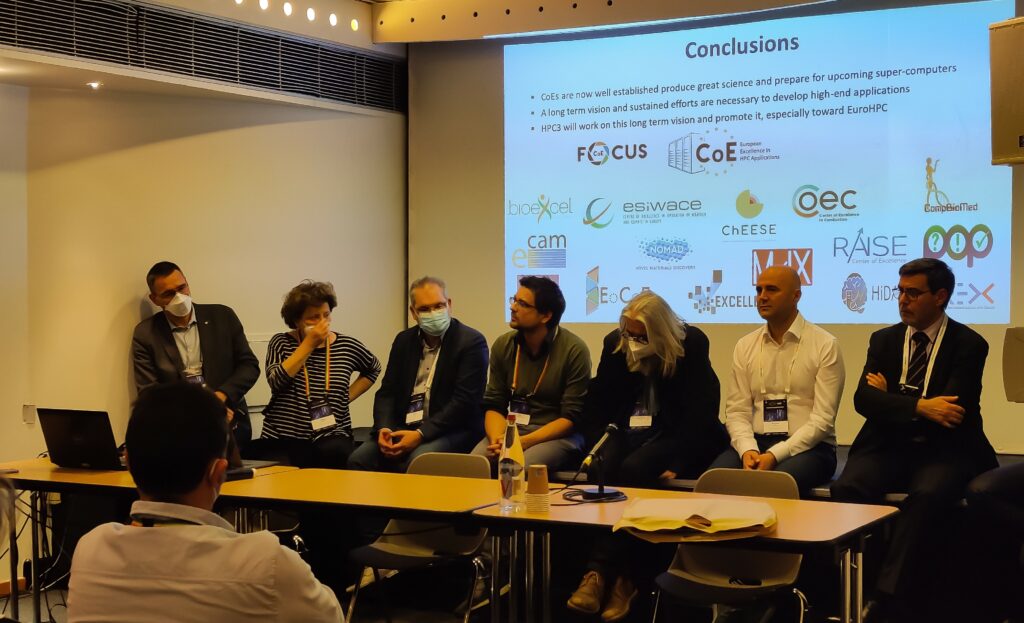
At the workshop on the European HPC ecosystem on Tuesday 22 March at 14:45, where the diversity of the ecosystem was presented around the Infrastructure, Applications, and Technology pillars, project coordinator Dr. Guy Lonsdale from Scapos talked about FocusCoE and the CoEs’ common goal.
Later that day from 16:30 until 18:00h, the FocusCoE project hosted a session titled “European HPC CoEs: perspectives for a healthy HPC application eco-system and Exascale” involving most of the EU CoEs. The session discussed the key role of CoEs in the EuroHPC application pillar, focussing on their impact for building a vibrant, healthy HPC application eco-system and on perspectives for Exascale applications. As described by Dr. Andreas Wierse on behalf of EXCELLERAT, “The development is continuous. To prepare companies to make good use of this technology, it’s important to start early. Our task is to ensure continuity from using small systems up to the Exascale, regardless of whether the user comes from a big company or from an SME”.
Keen interest in the agenda was also demonstrated by attendees from HPC related academia and industry filling the hall to standing room only. In light of the call for new EU HPC Centres of Excellence and the increasing return to in-person events like EHPCSW, the high interest in preparing the EU for Exascale has a bright future.
AI Café: How can HPC technologies help AI
On March 17th, FocusCoE participated in a live AI for Media Web Café alongside the three Centres of Excellence: RAISE, CoEC, and HiDALGO. The virtual session brought together the CoEs working in AI sectors to explain how HPC technologies can help AI. In all, over 40 participants from industry and research joined the hour and a half café.
Starting off the presentations, Xavier Salazar introduced FocusCoE and the resources available at the “one stop shop” of our website such as technological offerings. Here, anyone from industry or research who wants to learn more can also read up on use cases, search available codes and software packages, and link directly to the CoEs of interest.
Next, the CoEs presented several case studies on how they are using AI in combination with HPC technologies to solve real-life problems. Although each CoE’s application of AI differed, some common themes emerged in answer to the question, “How can HPC help AI?” Firstly, AI is now benefitting from the increasing availability of large and even “big” data sets but often can’t use them in their entirety due to excessive processing time. This is by far the clearest example of how HPC can help. In a use case described by Andreas Lintermann on behalf of CoE RAISE, a dataset that was estimated to take over 300 hours to process using 4 GPUs was modified to run on HPC systems theoretically as large as 2000 GPUs in as little as 45 minutes! With the ability to more quickly train AI models using more data, it is also possible to increase the accuracy of the resulting models or surrogates. In turn, building more accurate surrogates speeds up the ability to run accurate simulations since one no longer needs to build the simulation models by hand.
Using AI to build data model surrogates also has benefits for data privacy, as discussed by Christoph Schweimer from HiDALGO. When modelling how messages spread across social media, researchers initially had to build social network graphs manually from data harvested from real social media users, whose privacy had to be strictly protected. However, with HPC computing resources, HiDALGO researchers were able to use those real graphs to train AI to build simulated social network graphs instead. These simulated graphs share the same characteristics of real graphs but require far less time to create and don’t rely on any real-user data: thus holding no privacy risks to users.
The experience gained through these use cases has naturally brought several opportunities and challenges to light, which were also discussed over the course of the program. For instance, Temistocle Grenga from CoEC highlighted the existing bottleneck of moving data between different types of processors (CPU and GPU, as examples).
Lastly, CoEs summarized the numerous resources in terms of services and training opportunities they provide to help AI experts learn to exploit the benefits of HPC. As an immediate example, CoEC will participate this week in South-East Europe Combustion Spring School 2022. For ongoing information on training like this, make sure to bookmark our training calendar, which shows events from all the EU HPC CoEs.
For the full recording of this event, check out the video below!
FocusCoE Hosts Intel OneAPI Workshop for the EU HPC CoEs
On March 2, 2022 FocusCoE hosted Intel for a workshop introducing the oneAPI development environment. In all, over 40 researchers representing the EU HPC Centres of Excellence (CoEs)were able to attend the single day workshop to gain an overview of OneAPI. The 8 presenters from Intel gave presentations through the day covering the OneAPI vision, design, toolkits, a use case with GROMACS (which is already used by some of the EU HPC CoEs), and specific tools for migration and debugging.
Launched in 2019, the Intel OneAPI cross-industry, open, standards-based unified programming model is being designed to deliver a common developer experience across accelerator architectures. With the time saved designing for specific accelerators, OneAPI is intended to enable faster application performance, more productivity, and greater innovation. As summarized on Intel’s OneAPI website, “Apply your skills to the next innovation, and not to rewriting software for the next hardware platform.” Given the work that EU HPC CoEs are currently doing to optimise codes for Exascale HPC systems, any tools that make this process faster and more efficient can only boost CoEs capacity for innovation and preparedness for future heterogeneous systems.
The OneAPI industry initiative is also encouraging collaboration on the oneAPI specification and compatible oneAPI implementations. To that end, Intel is investing time and expertise into events like this workshop to give researchers the knowledge they need not only to use but help improve OneAPI. The presenters then also make themselves available after the workshop to answer questions from attendees on an ongoing basis. Throughout our event, participants were continuously able to ask questions and get real-time answers as well as offers for further support from software architects, technical consulting engineers, and the researcher who presented a use case. Lastly, the full video and slides from presentations are available below for any CoEs who were unable to attend or would like a second look at the detailed presentations.
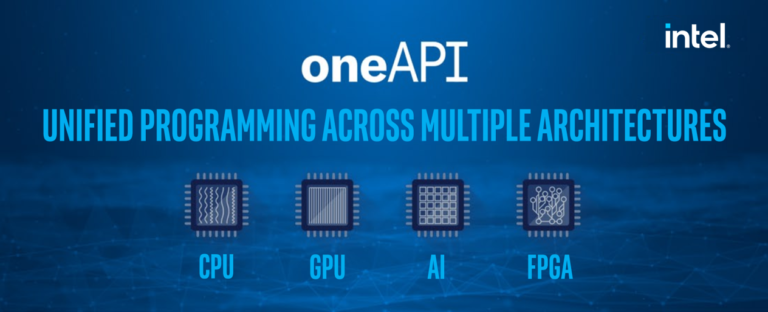
SIMAI 2021
The 2020 edition of the bi-annual congress of the Italian Society of Applied and Industrial Mathematics (SIMAI) has been held in Parma, hosted by the University of Parma, from August 30 to September 3, 2021, in a hybrid format (physical and online). The conference aimed to bring together researchers and professionals from academia and industry that are active in the study of mathematical and numerical models and their application to industry and general real-life problems, stimulate interdisciplinary research in applied mathematics, and foster interactions between the scientific community and industry. Six plenary lectures have been covering a wide range of topics. In this edition, a posters session was also organized to broaden the opportunity to disseminate the results of interesting research. A large part of the conference was dedicated to minisymposia, autonomously organized around specific topics by their respective promoters. Furthermore, an Industrial Session gathering together both academic and industrial researchers was organized, particularly with more than 70 industry representatives focusing on mathematical problems encountered in R&D areas.
Within the SIMAI conference, the minisymposium on HPC, European High-Performance Scientific Computing: Opportunities and Challenges for Applied Mathematics” was organized by ENEA within the framework of project FocusCoE, and a contribution to the aforementioned Industrial Session was given through a talk on results on Hydropower production modelling obtained by project EoCoE. In the minisymposium agenda of 3th of September (9:30-12:00), five presentations (20 min + 5 min Q) have been made from CoEs representatives: Ignatio Pagonabarraga (CoE: E-CAM), Alfredo Buttari (CoE: EoCoE), Francesco Buonocore (CoE: EoCoE), Pasqua D’Ambra (CoEs: EoCoE. EUROHPC project:TEXTAROSSA), Tomaso Esposti Ongaro (CoE: ChEESE). The number of sustained participants has been ca. 25.
The FocusCoE contribution within the industrial session of September 1 (17:50-18:15) has been made through a talk of prof. Bruno Majone (CoEs: EoCoE) presented by Andrea Galletti (CoEs: EoCoE) titled “Detailed hydropower production modelling over large-scale domains: the HYPERstreamHS framework”.
CoEs at Teratec Forum 2021 and ISC21
With the support of FocusCoE, a number of HPC CoEs will give short presentations at the virtual PRACE booth in the following two HPC-related events: Teratec Forum 2021 and ISC2021 that will take place towards the end of this month. See the schedule below for more details. Please reserve the slots in your calendars, registration details will be provided on the PRACE website soon!
“We are happy to see that FocusCoE was able to help the HPC CoEs to have a significant presence at this year’s editions of ISC and Teratec Forum, two major HPC events, enabled through our good synergies with PRACE”, says Guy Lonsdale, FocusCoE coordinator.
Teratec Forum 2021 schedule
Date / Event | Time slot CEST | Title | Speaker | Organisation |
Tue 22 June | 11:00 – 11:15 | EoCoE-II: Towards exascale for Energy | Edouard Audit, EoCoE-II coordinator | CEA (France) |
| 14:30 – 14:45 | POP CoE: Free Performance Assessments for the HPC Community | Bernd Mohr | Jülich Supercomputing Centre |
Thu 24 June | 13:45 – 14:00 | EXCELLERAT – paving the way for the evolution towards Exascale | Amgad Dessoky / Sophia Honisch | HLRS |
ISC 2021 schedule
Date / Event | Time slot CEST | Title | Speaker | Organisation |
Thu 24 June | 13:45 – 14:00 | EXCELLERAT – paving the way for the evolution towards Exascale | Amgad Dessoky / Sophia Honisch | HLRS |
Fri 25 June | 11:00 – 11:15 | The Center of Excellence for Exascale in Solid Earth (ChEESE) | Alice-Agnes Gabriel | Geophysik, University of Munich |
| 15:30 – 15:45 | EoCoE-II: Towards exascale for Energy | Edouard Audit, EoCoE-II coordinator | CEA (France) |
Tue 29 June | 11:00 – 11:15 | Towards a maximum utilization of synergies of HPC Competences in Europe | Bastian Koller, HLRS | HLRS |
Wed 30 June | 10:45 -11:00 | CoE | Dr.-Ing. Andreas Lintermann | Jülich Supercomputing Centre, Forschungszentrum Jülich GmbH |
Thu 1 July | 11:00 -11:15 | POP CoE: Free Performance Assessments for the HPC Community | Bernd Mohr | Jülich Supercomputing Centre |
| 14:30 -14:45 | TREX: an innovative view of HPC usage applied to Quantum Monte Carlo simulations | Anthony Scemama (1), William Jalby (2), Cedric Valensi (2), Pablo de Oliveira Castro (2) | (1) Laboratoire de Chimie et Physique Quantiques, CNRS-Université Paul Sabatier, Toulouse, France (2) Université de Versailles St-Quentin-en-Yvelines, Université Paris Saclay, France |
Please register to the short presentations through the PRACE event pages here:
| PRACE Virtual booth at Teratec Forum 2021 | PRACE Virtual booth at ISC2021 |
| prace-ri.eu/event/teratec-forum-2021/ | prace-ri.eu/event/praceisc-2021/ |
FocusCoE organizes two workshops at EHPCSW21
With the support of the FocusCoE project, a number of the HPC CoE participated in the first online edition of the EuroHPC Summit Week 2021 (EHPCSW21) in the context of two half-day workshops: the first one was titled “CoEs on the road to Exascale” held on 23 March 2021 and the second one was a training session titled “HPC Education & Training – Perspectives from EU13 Member States” held on Friday 26 March 2021. The high interest in the workshops was reflected by the number of participants from both academia and HPC-related industry, with over 100 participants in total for each workshop.
The session on Tuesday was structured in two parts: the first one started with an overview of FocusCoE project given by Guy Lonsdale, FocusCoE coordinator, followed by a presentation from Edouard Audit (CEA) about the European HPC Centres of Excellence (CoEs) with a focus on their Applications. The second part was organised as a live panel discussion moderated by Erwin Laure (MPCDF) and addressed the status and future of Applications Support in EuroHPC.
“We are glad that various CoEs participated actively in the EuroHPC Summit Week giving them an opportunity to disseminate their latest results as well as to interact with the EHPCSW21 attendees. While we all miss the opportunity for physical events, one of the positive side-effects of the online environment is that it allows many others to view the recordings of our workshops after the event and thus increase the potential impact”, says Guy Lonsdale.
The session on Friday, chaired by Simon Wong (ICHEC), focused on the HPC education and training landscape among the EU13 Member States with individual talks on existing programmes, target communities and industries, and future perspectives. The audience was provided with a range of insights relevant for the development of the European HPC education and training ecosystem.
About the EHPCSW21
The EuroHPC Summit Week (EHPCSW) 2021 gathers the main European HPC stakeholders from technology suppliers and HPC infrastructures to scientific and industrial HPC users in Europe. As in previous years, PRACE, the Partnership for Advanced Computing in Europe, organised the eighth edition of its Scientific and Industrial Conference (PRACEdays21) within the EHPCSW 2021. PRACEdays21 will bring together experts from academia and industry who will present their advancements in HPC-supported science and engineering.
FocusCoE Webinar: Opportunities and Challenges for Industrial Applications

This webinar covers some of the most critical research areas of the European Centres of Excellence (CoE) in high-performance computing, highlighting topics such as physical-mathematical modelling, numerical algorithms and scientific libraries.
It includes several examples of how the CoE’s activities and applications result in tangible benefits to address scientific and industrial challenges.
Speakers & Topics:
- Massimo Celino (ENEA): EoCoE: the European Energy oriented Centre of Excellence in HPC
- Alfredo Buttari (CNRS, France): Parallel block low-rank sparse direct solvers with applications
- Jose Gracia (HLRS, Germany): POP – Performance Analysis as a Service
- Alison Walker (Univ. of Bath, UK): Working with SME on the design of new energy materials
New CoE RAISE: Research on AI- and Simulation-Based Engineering at Exascale
Artificial intelligence (AI) methods are developing at a rapid rate and being progressively applied to numerous workflow stages to solve complex problems. Analysing and processing big data requires high computational power and scalable AI solutions. Therefore, entirely new workflows must be developed from current applications that can be run efficiently on future high-performance computing (HPC) architectures at exascale. To tackle these topics, a new European Centre of Excellence “Research on AI- and Simulation-Based Engineering at Exascale” (CoE RAISE) was founded and is being funded by the EU.
Forschungszentrum Jülich coordinates the CoE RAISE, which was launched on 1 January 2021 with a total budget of around € 5 million. The CoE brings together eleven full partners and two third parties with expertise in AI and HPC.
